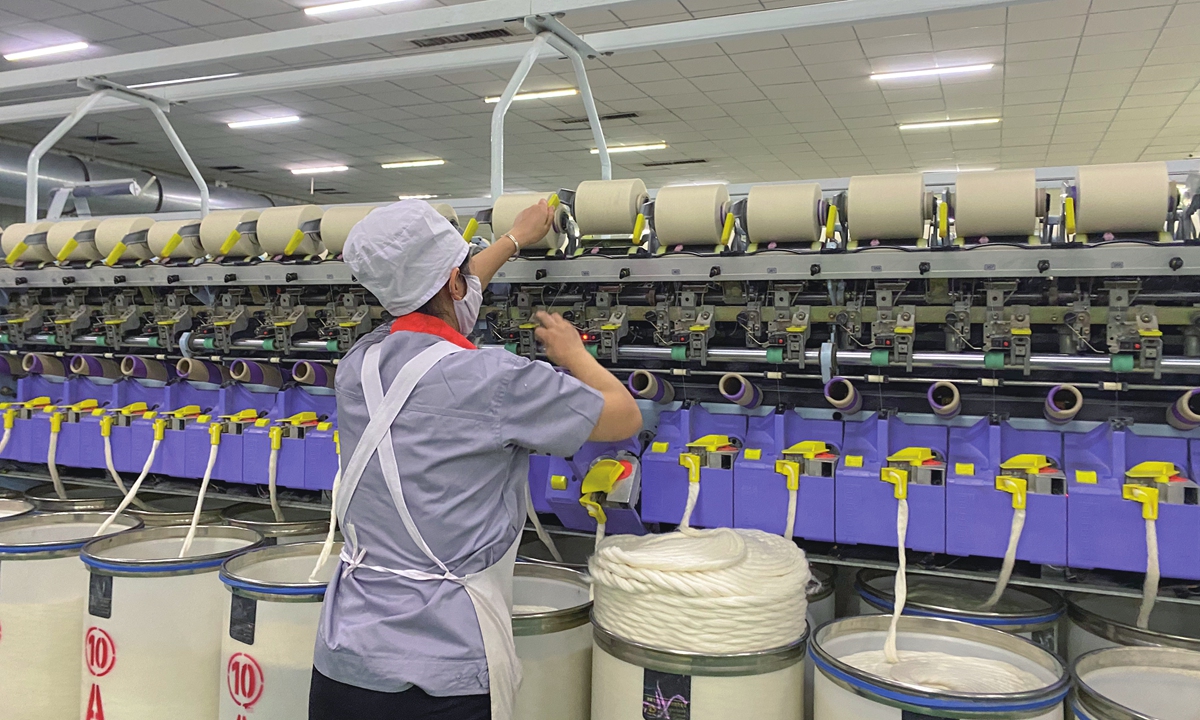Divisions of XPCC contribute to social stability, promote residents’ income
By Liu Xin in Urumqi and Yu Jincui in Tumxuk Source: Global Times Published: 2020/9/23 21:23:40 Last Updated: 2020/9/23 22:23:40

A harvest scene in Northwest China's Xinjiang Uygur Autonomous Region Photo: VCG
Editor's Note:
The practice of stationing garrison troops to cultivate and guard border areas is a tradition of China's history in developing and safeguarding its frontiers. The Xinjiang Production and Construction Corps (XPCC), which was established in 1954, has since made strenuous efforts to fulfill the responsibilities of cultivating and guarding the border areas.
XPCC workers have reclaimed ecological oases from the desolate Gobi desert, initiated Xinjiang's modernization, built large-scale agriculture and industrial and mining enterprises, and established new cities and towns through joining hands with residents of all ethnic groups. The corps has contributed greatly to Xinjiang's development by promoting unity among ethnic groups, maintaining social stability and strengthening national border defense.
By the end of 2019, the corps had 14 divisions with an area of 70,000 square kilometers under its administration. It contributed a total GDP of 274.707 billion yuan ($40.46 billion).

A worker works at a textile factory in Tiemenguan city, Xinjiang Uygur Autonomous Region, on September 10. Photo: Yu Jincui/GT
It was 5 pm on September 9 - the busiest time for Jiuding Market in Urumqi of Northwest China's Xinjiang Uygur Autonomous Region had passed while cars transferring vegetables stopped in lines. Vendors exhausted from a long day put boxes of vegetables in order and checked their accounts.
"Cucumbers from Shandong Province are 4 yuan ($ 0.59) for a kilogram, cauliflowers from Lanzhou of Gansu Province are 4.5 yuan to 4.8 yuan for a kilogram…" said Shao Wei, a vendor introducing his vegetables from different places in China.
Although the city of Urumqi has been on pause from the middle of July to the beginning of September due to a sudden outbreak of COVID-19 infections, Shao and many other vendors in Jiuding Market did not rest. By implementing strictest epidemic control measures, they helped transfer vegetables to residents who were under home quarantine.
Jiuding Market, which is affiliated to a group of XPCC's 12th Division, was put into use since 2013 and was the largest market for vegetables and fruits in China's northwestern areas. As the largest agricultural trading market in Xinjiang, in 2019, the market's total trading volume reached 3.51 million tons. As the largest "vegetable and fruit basket" for Xinjiang, it takes 50 percent of the supplies for vegetables, fruits and meat in summer and 85 percent in winter.
Managing the market to secure vegetables supplies during the COVID-19 lockdown of the region was very important. As the market took the responsibility to discharge 85 percent of the vegetables needed in Urumqi, it took various measures to stabilize the prices, said Liu Guangming, chief executive of the managing company of the market.
"To ensure residents had vegetables at normal prices during the lockdown, we decreased and exempted many managing fees for vendors and published prices for 30 kinds of vegetables every day," Liu told the Global Times.
Those efforts helped stabilize the prices of vegetables for residents in Urumqi. The XPCC, with which the market is affiliated, was awarded by China's central government.
As a division that runs across five cities and prefectures in Xinjiang, the 12th Division of the XPCC contributed 22.885 billion yuan of GDP in 2019 and has promoted emergency, advanced equipment manufacturing, food and pharmacy industries, as well as 96 agricultural and industrial cooperatives to help increase residents' incomes, according to data from the division.
Diversifying industries for economic development to create jobs has also been an important mission for divisions of the XPCC across Xinjiang region for decades.
For example, Tiemenguan, formerly the settled and cultivated areas of the Second Division of the XPCC, was established as a city in December 2012. The Economic Development Area of Tiemenguan, with an area of 41.1 square kilometers, is the main platform for the city to attract investments and projects. Till now, 77 enterprises, covering textiles, equipment manufacturing, and biochemistry have settled in the Economic Development Area, providing about 7,130 job opportunities, according to Luan Xuehui, a deputy head of the Publicity Department of the CPC Tiemenguan Party Committee.
Tukiz Gupur, 27, a Uygur woman, came to work in a textile factory in the Economic Development Area of Tiemenguan four years ago. She is a single mother who now earns more than 3,800 yuan per month. The happiest day of every month for her is the day she gets paid, she told the Global Times.
Tukiz said she gained the job opportunity thanks to the recommendation of her younger brother who began to work in the factory earlier than her. "I want to earn money to provide my kid a good living environment," Tukiz said, adding that her work as a textile worker is important for her. She said the factory signed contracts that provide social insurance with her and has provided free technical and language training.
Of the 544 employees in the Tukiz's textile factory, 381 are Uygurs and 270 are from poor rural areas in the southern Xinjiang. To enrich the lives of workers of minority ethnic groups, Tukiz said the company holds celebrations on holidays such as Eid al-Adha and will also give extra bonuses.
Zhao, chairman of the textile factory Tukiz works at, told the Global Times the factory has provided free dormitories to employees, and has taken the needs of couples into consideration, offering double rooms.
Halily Kader was a vendor who sold bottled water before he opened his own drinking water factory with the help of Party branches of the sixth and 16th companies, 51st regiment of the Third Division in Tumxuk, in the western part of Xinjiang.
He told the Global Times that when he first raised the idea of establishing a drinking water factory to the Party branches of the companies, he gained support. From purchasing equipments to applying a business license and gaining an approval from local food security bureau, the Party branches helped a lot. Halily said he was also given a poverty alleviation fund of 650,000 yuan for renovating an abandoned factory into his new water plant.
Now, his water factory could make profits of 1 million yuan annually and has lifted 21 workers it employs out of poverty. The employees earn 2,000 yuan to 3,000 yuan per month.
The above examples are an epitome of how the XPCC closely involved in Xinjiang's development and has made important contributions to promoting ethnic unity, social stability and border security, and living in harmony with all ethnic groups in the region, analysts said.
Click to read more: One mission in life: safeguard border for motherland
Newspaper headline: Frontier of freedom
Posted in: IN-DEPTH